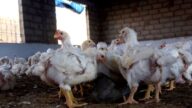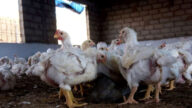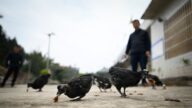【新唐人2014年02月17日訊】中共官媒公布的資料顯示,截至2月10號,中國大陸已經確診H7N9的患者為185人,死亡47人。不過,比表面數字看起來更為嚴重的是,廣州市場從2月15號開始,所有活禽市場關閉兩個星期,而浙江杭州市把主城區的活禽市場永久性關閉。人們擔心的是,今年的H7N9禽流感會超過2003年的「非典」(SARS)嗎?請看報導。
由於廣東H7N9禽流感的感染者不斷增加,廣州當局決定,從2月15號開始,廣州活禽市場關閉兩個星期。
廣東省疾控部門15號的通報聲稱,廣州又新增兩例人類感染H7N9禽流感病例,其中79歲的老翁,病情危重。
統計顯示,自去年8月,惠州通報首例H7N9病例以來,廣東已經確診70例人類感染H7N9禽流感病例,14人死亡。
浙江杭州控制H7N9禽流感的條件更為苛刻。
杭州當局14號發佈了《建立人感染H7N9禽流感源頭防控長效機制的實施辦法》,根據這一「實施辦法」,杭州的上城區、下城區及西湖區等主城區,不再重新開啟活禽交易。此外,蕭山區、餘杭區的花鳥活禽市場將繼續休市3個月。
杭州當局的新規定還說,對於那些仍進行活禽交易的專業市場,城市區縣農貿市場,農村集市則要採取更嚴格的衛生管理措施。
據浙江省12號的通報,今年浙江省已纍計感染H7N9禽流感病的人數為84例,高居全國之首﹔僅1月份就有61例,其中17人死亡。
浙江維權人士趙先生:「其實,我們一個諸暨市就有30幾個人已死掉了,死了幾百個人也不知道而已。你死了幾百個他說死了30幾個,電視上放出來的都是假的。」
據浙江公開的確診H7N9禽流感人數顯示,杭州和寧波佔據前兩位,而諸暨市是紹興市的一個縣級市,人口約佔紹興的1/5。
美國中文媒體《大紀元》記者在一月底就獲知,浙江省H7N9禽流感的嚴重性遠超中共官方公布的,杭州市第一醫院感染科已經沒有病床,住院需要先預約﹔寧波的一家醫院甚至有幾百人排隊等待住院。
上海市一位醫生也對美國《大紀元》新聞網表示,H7N9禽流感的檢測費用高達3000元,有很多患者根本負擔不起,所以實際確診病例的數據並不準確,更多患者沒有進行檢測,而上海市衛生部門也對各醫院下達了不要上報的通知,所以導致報告病例數很少。
有北京市民透露,現在北京市已經準備好了軍隊,一旦H7N9禽流感疫情不能控制,就會像2003年處理SARS那樣處理。
中共官媒的報導聲稱,截至2月10號,大陸今年H7N9禽流感確診超180例,死亡47人,除了浙江和廣東以外,北京、上海、江蘇、安徽、福建、湖南、貴州等省份,都出現了死亡病例。但每天H7N9確診病例以5至7例規模繼續增長。
杭州市民魏禎淩表示,雖然老百姓擔心禽流感,但好像並不很怕。因為中國不僅是禽流感問題,空氣污染、毒食品等都是問題,老百姓已經防不勝防了。
浙江杭州市民魏禎淩:「中國的老百姓就是這個心態吧,過一天算一天,今天沒事就算阿彌陀佛了。因為生活中在這個社會中,危及健康的因素太多了。」
其實,在大陸以外,H7N9禽流感也有擴散的趨勢。
12號,香港確認了第5例人感染H7N9禽流感病例,目前患者病情危急,去年12月,則有一名來自深圳感染H7N9病毒的80歲男子,在香港死亡﹔而台灣疾病控制中心13號也聲明,一名來自中國江蘇的老年遊客,12月在臺被確診感染了H7N9病毒,目前仍在台灣住院治療。
越南動物衛生部門15號發佈消息說,另一型H5N1型禽流感在越南繼續蔓延,目前全越南已有8個省份出現疫情,而平福省近兩個月有兩人因感染H5N1禽流感而死亡。
春季是禽流感的爆發季節,2014年的禽流感會不會超過2002底爆發的「非典」,這正是人們所擔心的。
採訪/朱智善 編輯/宋風 後製/孫寧
Will China’s H7N9 Epidemic Be Comparable to SARS?
Chinese Communist Party (CCP) official
data confirms that up to February 10, there
have been 185 cases of H7N9, with 47 deaths.
All live poultry markets in Guangzhou are
closed for two weeks, as of February 15.
Hangzhou City in Zhejiang Province has permanently
closed all live poultry markets in metropolitan area.
These are thought to indicate a more serious situation.
Will the severity of H7N9 exceed that of SARS in 2003?
The following is our report.
With the number of victims of H7N9 continuing to increase,
Guangzhou authorities have been forced to close live
poultry markets for two weeks, which began on February 15.
On February 15, Guangdong Provincial CDC
reported two new cases of the H7N9 infection.
A 79-year-old man is reported to be in a critical condition.
Data shows that since the first case of H7N9 was reported
last August in Huizhou, there have been 70 confirmed
cases in Guangdong, with 14 dying of the infection.
Hangzhou City in Zhejiang Province has
conducted stringent controls for H7N9.
According to regulations issued by Hangzhou’s
authorities on February 14, three main districts
have permanently closed all live poultry markets.
Two other districts have closed markets for three months.
Hangzhou’s regulations also demand stringent hygiene
management to any markets remaining open in the city.
A Zhejiang Provincial briefing published on February 12
indicates there have been a total of 84 H7N9 cases this year.
This ranks it highest across China. Of the
cases reported in January, 17 people died.
Mr. Zhao, Zhejiang activist: “In fact, more
than 30 people in our city, Zhuji, have died.
It could be several hundred, but they told you
it’s 30, and all the reported numbers are false.”
According to the number of confirmed H7N9 cases in
Zhejiang, Hangzhou and Ningbo have the highest number.
Zhuji is a county-level city in Shaoxing, with the
population making up about 1/5 of the Province.
The Epoch Times was notified at the end of January
that the severity of H7N9 cases in Zhejiang Province
was far more more than what was officially published.
The Infectious Diseases Department of Hangzhou
First Hospital has run out of beds in it’s wards.
Patients are placed onto waiting lists to stay in the hospital.
The waiting list has reached several
hundred in a Ningbo hospital.
A doctor in Shanghai told the Epoch Times that
the cost for H7N9 tests are as high as 3,000 yuan.
Many patients cannot afford these costs.
Therefore, the actual confirmed cases
does not represent the actual situation.
The Shanghai health sector has notified regional hospitals
not to report cases, which resulted in fewer cases known.
Beijing residents have revealed that
the army has been prepared in Beijing.
It will apply control measures similar to those seen in the
SARS epidemic in 2003, in case of widespread outbreak.
Chinese state-controlled media reported
that as of February 10, more than 180
cases have been reported in the country.
A total of 47 deaths are reported from
Zhejiang, Guangdong, Beijing, Shanghai,
Jiangsu, Anhui, Fujian, Hunan, and Guizhou.
The number of confirmed cases of H7N9
continues to grow daily by between 5 and 7.
Hangzhou resident Wei Zhenling said
that people don’t seem to care much.
Even though they are concerned with the bird flu,
they are approaching it like air pollution and toxic food.
They have no way to prevent it from happening.
Wei Zhenling, Hangzhou resident: “That’s
the mentality of the people in China today.
They take it one day at a time,
as long as everything is still ok.
There are just too many risks in this Chinese society.”
It also seems that H7N9 avian influenza
has spread outside of China.
On February 12, Hong Kong confirmed a
case of H7N9, who is still in a critical condition.
Last December, an 80-year-old man infected with
H7N9 virus from Shenzhen died in Hong Kong.
Taiwan’s CDC also reported on February 13 that a tourist
from Jiangsu, China, was confirmed with H7N9 infection.
This tourist remained hospitalized in Taiwan.
Information released from the Vietnam animal health
department said that on the February 15, another
type of avian flu, H5N1, has spread in Vietnam.
As many as eight provinces in Vietnam
have identified infected people.
Two people have died in in Binh Phuoc Province.
Avian flu tends to break out in the Spring.
There is concern that avian flu in 2014 may be more
severe than the outbreak of SARS in 2002/ 2003.
Interview/ZhuZhishan Edit/ SongFeng Post-Production/ SunNing


























